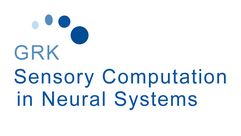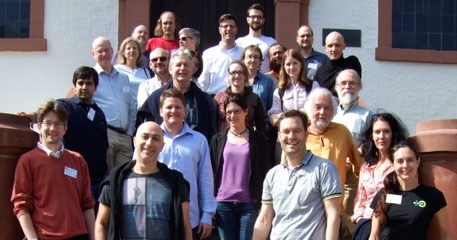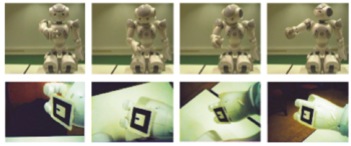projects
New DFG SPP The Active Self
06/06/17 23:42
Our proposal for initiating a new DFG Priority Programme was successful, “The Active Self” is now one of 17 new DFG SPPs in 2017 in Germany!
The active self (SPP 2134)
The Priority Programme brings together cognitive and behavioural scientists from various disciplines, including psychology and robotics, to study the sensorimotor grounding of the human minimal self – a concept that relates to a person’s phenomenal experience in the here and now and to the question of how we perceive ourselves to be in a particular situation. While this experience is likely to be dominated by information delivered by the senses, i.e., by self-perception in a literal, immediate sense, humans also have knowledge about themselves, amassed over years, and a sense of understanding how their self relates to others.
The relatively recent increasing interest in the self is fueled by important methodological improvements, such as the availability of virtual-reality techniques and affordable robots with humanoid characteristics, and the development of noninvasive methods to study cognition in infants, but also by converging lines of theoretical thinking related to ideomotor processes on the one hand and embodied cognition on the other. The programme will seek to unravel the degree to which our self-representation is plastic and sensitive to immediate experience, to which degree it is constrained by past experience, how it integrates experiences of agency and action-ownership, how it affects other cognitive processes, and to what degree self-representation can be established in artificial agents.

Foto: Natallia Vintsik / fotolia.com
Programme committee and team of coordinators:
Prof. Dr. Verena Hafner (Coordinator and Deputy Speaker); Humboldt-Universität zu Berlin, Department of Computer Science, Adaptive Systems
Prof. Dr. Bernhard Hommel (Scientific Coordinator and Speaker); Leiden University, Leiden (NL), Cognitive Psychology
Prof. Dr. Markus Paulus (Coordinator and Deputy Speaker); Ludwig-Maximilians-Universität München, Developmental Psychology
DFG Call Website: http://www.dfg.de/foerderung/info_wissenschaft/2017/info_wissenschaft_17_24/
SPP Website: http://www.activeself.de
The active self (SPP 2134)
The Priority Programme brings together cognitive and behavioural scientists from various disciplines, including psychology and robotics, to study the sensorimotor grounding of the human minimal self – a concept that relates to a person’s phenomenal experience in the here and now and to the question of how we perceive ourselves to be in a particular situation. While this experience is likely to be dominated by information delivered by the senses, i.e., by self-perception in a literal, immediate sense, humans also have knowledge about themselves, amassed over years, and a sense of understanding how their self relates to others.
The relatively recent increasing interest in the self is fueled by important methodological improvements, such as the availability of virtual-reality techniques and affordable robots with humanoid characteristics, and the development of noninvasive methods to study cognition in infants, but also by converging lines of theoretical thinking related to ideomotor processes on the one hand and embodied cognition on the other. The programme will seek to unravel the degree to which our self-representation is plastic and sensitive to immediate experience, to which degree it is constrained by past experience, how it integrates experiences of agency and action-ownership, how it affects other cognitive processes, and to what degree self-representation can be established in artificial agents.

Foto: Natallia Vintsik / fotolia.com
Programme committee and team of coordinators:
Prof. Dr. Verena Hafner (Coordinator and Deputy Speaker); Humboldt-Universität zu Berlin, Department of Computer Science, Adaptive Systems
Prof. Dr. Bernhard Hommel (Scientific Coordinator and Speaker); Leiden University, Leiden (NL), Cognitive Psychology
Prof. Dr. Markus Paulus (Coordinator and Deputy Speaker); Ludwig-Maximilians-Universität München, Developmental Psychology
DFG Call Website: http://www.dfg.de/foerderung/info_wissenschaft/2017/info_wissenschaft_17_24/
SPP Website: http://www.activeself.de
EARS project presents first results in Grenoble
19/03/15 16:43
The EARS partners presented the first results of the EARS project - Embodied Audition for RobotS - in Grenoble.
The live demos included robot head motions optimized for both audio information and intuitive HRI, internal simulations and dynamic blind source separation.

You can also follow @ears_eu on twitter to get the latest news on robot audition.
The live demos included robot head motions optimized for both audio information and intuitive HRI, internal simulations and dynamic blind source separation.

You can also follow @ears_eu on twitter to get the latest news on robot audition.
Humboldt-Princeton Centre for Reality Mining of Animal-Human Systems
30/05/14 10:20
We will be part of a newly established Humboldt-Princeton Centre for Reality Mining of Animal-Human Systems led by Prof. Arlinghaus (HU) and Prof. Couzin (Princeton).
Reality mining involves the collection and analysis of machine-sensed data regarding animal and animal-human social behaviour. It constitutes a highly innovative and largely overlooked research direction involving biologists, physicists and computer scientists.


Reality mining involves the collection and analysis of machine-sensed data regarding animal and animal-human social behaviour. It constitutes a highly innovative and largely overlooked research direction involving biologists, physicists and computer scientists.


new funding for GRK "Sensory Computation in Neural Systems"
30/05/14 09:51
The Research Training Group "Sensory Computation in Neural Systems" coordinated by Prof. Dr. Klaus Obermayer from TU Berlin receives further funding from the German Research Foundation until 2019. We are looking forward to further exciting research projects with new doctoral researchers!


Dagstuhl Seminar on "Spatial reference in the Semantic Web and Robotics"
02/04/14 12:42

We’ve organised a Dagstuhl Seminar (14142) on
Spatial reference in the Semantic Web and in Robotics

Organisers:
Simon Scheider (Universität Münster, DE)
Aldo Gangemi (CNR-ISTC National Research Council – Rom, IT)
Verena V. Hafner (HU Berlin, DE)
Werner Kuhn (University of California – Santa Barbara, US)
Luc Steels (Free University of Brussels, BE)
New EU project EARS on Embodied Audition for RobotS
29/12/13 15:20
The European project EARS, starting on January 1, 2014 for a period of three years, will address the fundamental problem of how to model and implement robot audition. The Cognitive Robotics group at Humboldt-Universität zu Berlin (Prof. Verena Hafner) will be one of six partners: University Erlangen-Nuremberg, Germany (Prof. Walter Kellermann, project coordinator), Imperial College London, UK (Prof. Patrick Naylor), Ben-Gurion University of the Negev, Israel (Prof. Boaz Rafaely), INRIA, France (Prof. Radu Horaud), and Aldebaran Robotics, France (Dr. Rodolphe Gelin).
Summary. The success of future natural intuitive human-robot interaction (HRI) will critically depend on how responsive the robot will be to all forms of human expressions and how well it will be aware of its environment. With acoustic signals distinctively characterizing physical environments and speech being the most effective means of communication among humans, truly humanoid robots must be able to fully extract the rich auditory information from their environment and to use voice communication as much as humans do. While vision-based HRI is well developed, current limitations in robot audition do not allow for such an effective, natural acoustic human-robot communication in real-world environments, mainly because of the severe degradation of the desired acoustic signals due to noise, interference and reverberation when captured by the robot’s microphones. To overcome these limitations, EARS will provide intelligent “ears” with close-to-human auditory capabilities and use it for HRI in complex real-world environments. Novel microphone arrays and powerful signal processing algorithms shall be able to localize and track multiple sound sources of interest and to extract and recognize the desired signals.
After fusion with robot vision, embodied robot cognition will then derive HRI actions and knowledge on the entire scenario, and feed this back to the acoustic interface for further auditory scene analysis. As a prototypical application, EARS will consider a welcoming robot in a hotel lobby offering all the above challenges. Representing a large class of generic applications, this scenario is of key interest to industry and, thus, a leading European robot manufacturer will integrate EARS’s results into a robot platform for the consumer market and validate it. In addition, the provision of open-source software and an advisory board with key players from the relevant robot industry should help to make EARS a turnkey project for promoting audition in the robotics world.
Update 03/2014: The EARS webpage is now online.
Summary. The success of future natural intuitive human-robot interaction (HRI) will critically depend on how responsive the robot will be to all forms of human expressions and how well it will be aware of its environment. With acoustic signals distinctively characterizing physical environments and speech being the most effective means of communication among humans, truly humanoid robots must be able to fully extract the rich auditory information from their environment and to use voice communication as much as humans do. While vision-based HRI is well developed, current limitations in robot audition do not allow for such an effective, natural acoustic human-robot communication in real-world environments, mainly because of the severe degradation of the desired acoustic signals due to noise, interference and reverberation when captured by the robot’s microphones. To overcome these limitations, EARS will provide intelligent “ears” with close-to-human auditory capabilities and use it for HRI in complex real-world environments. Novel microphone arrays and powerful signal processing algorithms shall be able to localize and track multiple sound sources of interest and to extract and recognize the desired signals.
After fusion with robot vision, embodied robot cognition will then derive HRI actions and knowledge on the entire scenario, and feed this back to the acoustic interface for further auditory scene analysis. As a prototypical application, EARS will consider a welcoming robot in a hotel lobby offering all the above challenges. Representing a large class of generic applications, this scenario is of key interest to industry and, thus, a leading European robot manufacturer will integrate EARS’s results into a robot platform for the consumer market and validate it. In addition, the provision of open-source software and an advisory board with key players from the relevant robot industry should help to make EARS a turnkey project for promoting audition in the robotics world.
Update 03/2014: The EARS webpage is now online.
Dagstuhl Seminar on "Spatial reference in the Semantic Web and Robotics"
31/07/13 18:21

From March 30 until April 4, 2014, we’re organising a Dagstuhl Seminar (14142) on
Spatial reference in the Semantic Web and in Robotics
Organisers:
Simon Scheider (Universität Münster, DE)
Aldo Gangemi (CNR-ISTC National Research Council – Rom, IT)
Verena V. Hafner (HU Berlin, DE)
Werner Kuhn (University of California – Santa Barbara, US)
Luc Steels (Free University of Brussels, BE)
German-Israeli Minerva School on Cognitive Robotics
01/06/13 23:42
We will be organising a German-Israeli Minerva School on Cognitive Robotics together with Ben-Gurion University of the Negev in March 2014 in Germany. The school will include talks and interactive workshops from different fields such as Robotics, Psychology, Cognitive Science and Neurosciences. We received funding through the Minerva foundation and BMBF, who support only one such school per year (http://www.minerva.mpg.de/minerva_schools/).

Update: We now have a Webpage for our event.

Update: We now have a Webpage for our event.

